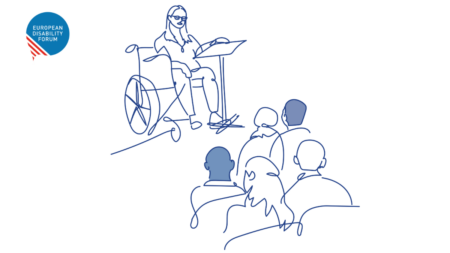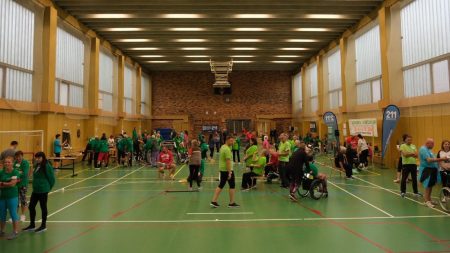
European Elections: candidates with disabilities must have equal chances
01.12.2023On International Day of Persons with Disabilities, we call on political parties to select and support candidates with disabilities who are interested in running for the European Elections. This is essential to ensure that the diversity of Europe’s population is represented in the European Parliament.
We also call on the European Union and national governments to ensure persons with disabilities have proper support to campaign and be elected on an equal footing with other candidates.
When Jamie Bolling entered politics in Sweden, she had “double the cost” to participate. Jamie is a wheelchair user in an inaccessible society, which means that she has to pay more to get where she needs to be. Despite this, no EU Member State has put forward specific support for candidates with disabilities.
Worse than that – most countries pose specific legal restrictions on persons with disabilities, barring them from being candidates. This is the case for all but 9 EU countries.
Our 2022 Human Rights Report on “political participation of persons with disabilities” confirms that the situation is dire. Persons with disabilities remain severely underrepresented as elected officials, despite being 15% of the population. For example, less than 5% of current Members of the European Parliament identify as a person with disabilities.
To the above restrictions, we must add other common challenges for candidates from minority groups and representing marginalised identities. These common challenges include being a target of hate speech and harassment and facing stereotypes and bias due to their identities. This is worse for candidates with multiple intersecting identities, such as women with disabilities, racialised persons with disabilities and LGBTQIA+ persons with disabilities.
Women are already a minority in political leadership positions, and women with disabilities are a “minority” within the minority of women in elected office. Women with disabilities and other candidates with multiple marginalised identities, therefore, need targeted support actions.
These barriers, often created by political parties and by the States themselves, run counter to States’ commitment to the UN Convention on the Rights of Persons with Disabilities, and its article 29 “participation in political and public life”.
In 7 months, voters have the chance to make European Union Institutions truly representatives of the Union’s diversity. But only if political parties, national governments, and the EU Institutions step up and support persons with disabilities.
Today, we call on political parties to act! We call on the European Union and its Member States and to act!
One such action could be an “access to elected office fund” that financially supports candidates with disabilities so that they can campaign on an equal basis with others.
We call on political parties to:
- Proactively approach persons with disabilities and include them as candidates.
- Provide additional support and implement measures for increased participation of women with disabilities as candidates.
- Ensure candidates with disabilities can campaign on an equal basis with others by providing additional support to overcome accessibility barriers or cover disability-related costs.
- Ensure processes, information, meetings, events and premises are accessible to persons with disabilities.
We call on the European Union and its Member States to:
- Put in place schemes and resources to support candidates with disabilities.
- Adopt a new EU Electoral Act and national laws allowing persons with disabilities to vote and stand for elections, regardless of legal capacity status.
- Guarantee the same level of rights for mobile EU citizens with disabilities.
- Guarantee the accessibility of the elections, including of actions relevant for candidates with disabilities.
- Set accessibility obligations for European and national political parties.
- Provide additional support and implement measures for increased participation of women with disabilities in the political process.
- Set rules to combat the harassment of candidates, including cyber harassment and violence. These rules should ensure the protection of women with disabilities and persons with disabilities with other intersecting identities.
Importantly, we call on all actors to properly support women with disabilities who wish to run as a candidate, including through financial support and the creation of specific networks and mentorship programs.
We also request all actors to proactively involve and consult persons with disabilities – through their representative organisations – to ensure all actions taken in this regard are appropriate and efficient.
Yannis Vardakastanis, President of the European Disability Forum, said:
“The path to becoming a candidate is still littered with legal and practical barriers for persons with disabilities. Political parties need to stop ignoring persons with disabilities – they need to support them to become candidates.”
Related documents
- Human Rights Report 2022 – political participation of persons with disabilities: the right to vote and stand for election
- European Disability Forum’s Manifesto on the European Elections 2024: “Building an inclusive future for persons with disabilities in the EU
- Our work on Political Participation
 Your Account
Your Account


